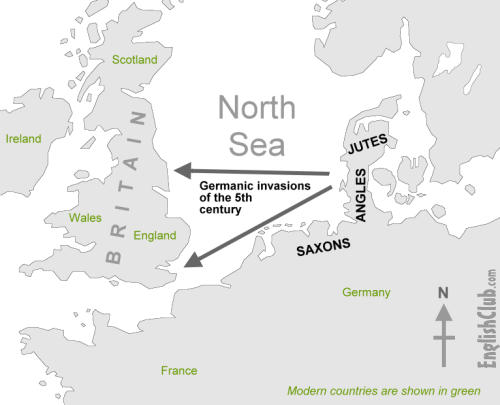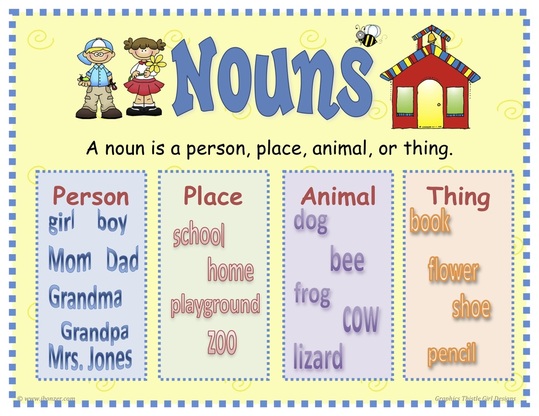History of the English Language
What is English?
A short history of the origins and development of English
The history of the English language really started with the arrival of three Germanic tribes who invaded Britain during the 5th century AD. These tribes, the Angles, the Saxons and the Jutes, crossed the North Sea from what today is Denmark and northern Germany. At that time the inhabitants of Britain spoke a Celtic language. But most of the Celtic speakers were pushed west and north by the invaders - mainly into what is now Wales, Scotland and Ireland. The Angles came from "Englaland" [sic] and their language was called "Englisc" - from which the words "England" and "English" are derived.

Germanic invaders entered Britain on the east and south coasts in the 5th century
Old English (450-1100 AD)
 Part of Beowulf, a poem written in Old English |
Middle English (1100-1500)
 An example of Middle English by Chaucer |
Modern English
Early Modern English (1500-1800)
Towards the end of Middle English, a sudden and distinct change in pronunciation (the Great Vowel Shift) started, with vowels being pronounced shorter and shorter. From the 16th century the British had contact with many peoples from around the world.

Hamlet's famous "To be, or not to be" lines, written in Early Modern English by Shakespeare
|
This, and the Renaissance of Classical learning, meant that many new words and phrases entered the language. The invention of printing also meant that there was now a common language in print. Books became cheaper and more people learned to read. Printing also brought standardization to English. Spelling and grammar became fixed, and the dialect of London, where most publishing houses were, became the standard. In 1604 the first English dictionary was published.
Late Modern English (1800-Present)
The main difference between Early Modern English and Late Modern English is vocabulary. Late Modern English has many more words, arising from two principal factors: firstly, the Industrial Revolution and technology created a need for new words; secondly, the British Empire at its height covered one quarter of the earth's surface, and the English language adopted foreign words from many countries.
.jpg)


Context Clues
Types of Context Clues
Definition
Synonym
Antonym
Examples
|
Explanation
Experience
Knowledge of Subject
|
Learning new words when reading
The first way to figure out the meaning of a word is from its context. The context is the other words and sentences that are around the new word. When you figure out the meaning of a word from context, you are making a guess about what the word means. To do this, you use the hints and clues of the other words and sentences. You won't always be right, but many times you will be. You might not be able to guess the exact meaning of a word, but you may be close enough to get the meaning of the sentence it is in. A basic strategy for unlocking the meaning of an unfamiliar word is to search the context of the sentence in which a new word appears for clues. Sometimes this can be easy to do because the author may have provided a definition or a synonym right there next to or near a term that you can use to unlock its meaning. A definition is a statement giving the meaning of a word. A synonym is a word that means almost the same as another.
For example, read the following sentence: "Don't think of words as separate, discrete items, or entities." What is the meaning of the word entities? The definition is right there - separate, discrete items. But what is the meaning of discrete? The meaning of that word is right there too--separate.
When in doubt about the meaning of an unfamiliar word, look around in the sentence; check to see if there is a definition or synonym clue to help you unlock meaning.
Another kind of context clue (in addition to definitions and synonyms embedded in sentences) is a word or words of opposite meaning (antonym) set somewhere near a word that is unfamiliar. If you find a word or words of opposite meaning and you recognize it or them, you are "home free." You can unlock the meaning of the unfamiliar word.
For example, read the following sentence: "I was not exactly enamored of the travel plans my agent made for me; my lack of enthusiasm was triggered by the eight-hour layover required between flights." What is the meaning of the word enamored? You can use the context of the sentence to reason in this way: Enamored of means just the opposite of lacking in enthusiasm for.
Strategy
Step 1: Check for synonyms or definitions embedded right there. If you find a synonym or definition, reread the sentence with the new term keeping that synonym or definition in mind.
Step 2: Check for an antonym clue. If you find one, think about its meaning, actually telling yourself the opposite meaning. Then reread the sentence and rephrase it in your own mind.
Context Clues: Substitution
At times, rereading a sentence that contains an unfamiliar term and substituting a word or phrase for it that makes sense can help you to unlock the meaning of the unfamiliar word. To understand the substitution strategy, read the following sentence:
"When we stayed at the military base, each Saturday we went to the commissary to buy the food and supplies we would need for the next week."
Although you may never have visited a commissary, given the use of the word in this sentence, you immediately can substitute the word store for the word commissary. You probably can wrestle an even more complete meaning for commissary from the overall context of the sentence: a store for food and supplies that is located on a military base.
Steps in the substitution strategy are as follows:
Step 1: When you read a sentence that you have trouble understanding because of an unfamiliar word in it, reread the sentence and substitute a word that seems to make sense in the context.
Step 2: Read on. If the word you substituted does not make sense in the context of the rest of the paragraph, try again.
Step 3: If the sentence still does not make sense to you and you do not understand the main point the author is making in the paragraph, look for synonym, definition, and antonym clues. If you are still uncertain, check a dictionary.
Context Clues: Multiple Meanings
As you have learned, a basic strategy for unlocking the meaning of an unfamiliar word is to search the context of the sentence in which a new word appears for clues. This is especially important when a word has multiple meanings that you already know and you must decide the particular one that applies. Try using the following strategy:
Step 1: Check the context for clues: definitions and synonyms given "right there" as well as words of opposite meaning - antonyms.
Step 2: Substitute each meaning you know in the context of the sentence until you find one that makes good sense there. (Hennings, p. 48)
There is probably no surer or sounder way to improve your reading permanently than by building a strong, precise vocabulary, and the only way to build your vocabulary is by reading a lot. In a precise vocabulary, every word is learned as a concept. You know its ancestry, its principal definition as well as several secondary definitions, its synonyms and the subtle differences among them, and its antonyms. Then, when you encounter it in your reading, this vast store of knowledge flashes before you, illuminating the sentence, the paragraph, and the idea the author is trying to convey (Pauk, p. 346).
References:
Pauk, Walter. How to Study in College. Fourth Edition. 1989.
Mohr, C., & Nist, S. Improving Vocabulary Skills. 1997.
Hennings, Dorothy. Vocabulary Growth. Strategies for College Word Study. 2001.
How to Live a beautiful Like Me?
When I was a little bud(young), I was living with my grandparents because my mama have to work in Manila to support our needs together with my eldest sister,her named is Mary Joy. I am wondering why should I have a broken Family? There are lots of people out there,why me is included to suffer this kind of incompleteness in life. I hate my father because he left his responsibility to my mother alone!I never seen his face since birth! I can't blame him but I deserve an acceptable reason.I failed to do so!
Everyone aspire to have a father to complete the individual's life but with the presence of my mama and beloved grandparents,they filled my emptiness with love and care to mold me into better person. Honestly,I was so bitter with father but that was before.I am happy with my life now. Why should I have to look back if there is better life awaits me?
I'm a college freshman,taking Bachelor of Science in Information Technology at Partido State University. I met different kind of people with varied cultures,traditions,beliefs and attitudes. I must be flexible to cope up with the demand in the environment I will be dealing with.
College life is not easy as you think. Why? First,new adjustments to the classmates, teachers and friends,Next,shortage of allowances,then,pressured projects because of the deadline,tiring activities such as scary recitation,endless quizzes and solving math problems.I have to be prepared at all times ;aim high and strive for the BEST!
Unlike during my early childhood,I was so easy-go-lucky,sleeping inside the classroom,cutting classes and teacher's burden as being as pasaway. Guess what?I was awarded as First Honor! I can't believe it!
When I was in high school,I didn't mind of getting high grades nor to compete with my classmates.If there was an activity in school like intramural,I preferred to stay at home and make some sketching of my favorite gowns and sandals,cartoon characters and draw the nature's beauty.
A little bud bloom now into a fascinated flower,despite of my emptiness (absence of father's figure),I am turning into a full-grown woman!
